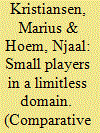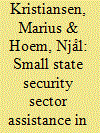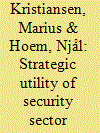|
|
|
Sort Order |
|
|
|
Items / Page
|
|
|
|
|
|
|
| Srl | Item |
| 1 |
ID:
197571


|
|
|
|
|
| Summary/Abstract |
Special Operations Forces (SOF) need to adapt to a new operating environment, characterized by competition, state-centric threats, and the use of conventional military power. The adaptation is a consequence of the existing causal relationship between given security environments and the role and activities of SOF. In the case of the High North, this entails SOF pivoting from being the supported entity to a supporting entity of the combined joint force. Norwegian, and U.S. SOF can effectively campaign in this theater by focusing at how different aspects influence future success. Aspects discussed are (i) Perspective, (ii) Conventional Military Capabilities, (iii) SOF Capabilities and Authorities (iv) Development and Investments, and (v) Adversaries and Competitors. By prioritizing and understanding how these aspects influence future campaigns, the Combined effort of Norway and the U.S. will be postured to support strategic objectives within the High North as defined by policymakers and military commanders.
|
|
|
|
|
|
|
|
|
|
|
|
|
|
|
|
| 2 |
ID:
188342


|
|
|
|
|
| Summary/Abstract |
This article explores deterrence as an element in cybersecurity strategy from a small state perspective. The cyber domain presents novel challenges for strategy makers, and applying deterrence in the cyber domain requires an organized and multinational approach – since few states can leverage deterrence in this all-encompassing domain on their own. Deterrence has been an important factor in shaping global security for half a century, but when applied to the cyber domain there are certain inherent mechanisms that must be understood in order to generate the desired effects. Key issues discussed are the volume of agents capable of operating and creating effects in the domain, and the availability of tools and techniques. These issues concerning actors and vectors makes it difficult to survey threats and create targeted deterrence. Furthermore, the cyber milieu makes it difficult to connect action to motives, thereby further complicating any attempt to analyze the actual importance of observable effects. From a strategist’s point of view, these general characteristics are exacerbated by the fact that the international community does not have a common language or shared platform to uniformly approach these issues. Absent clarity on some fundamentals the core issues of attribution and proportionality becomes a hindrance to effective deterrence.
|
|
|
|
|
|
|
|
|
|
|
|
|
|
|
|
| 3 |
ID:
188363


|
|
|
|
|
| Summary/Abstract |
This article argues how Security Sector Assistance (SSA) can be seen as a relevant tool for achieving small states strategic objectives in an indirect manner. The article directs focus toward how small states, by thinking indirectly, can ensure their own security concerns are being managed and remain influential actors in regional and global security politics in an age of great power competition. The soon-to-be two decades long, and still ongoing, global war on terror has defined several small states’ militaries around the world. This makes the current shift toward great power competition even more challenging. The interaction between great powers are dictating international politics; their strategic choices continuously shaping regional and global security. Small states seem to end up with little to no opportunity to influence the overall security-situation, international and regional strategies or politics. Yet, the authors argue there is plenty room for maneuver that allow small states to have a significant impact, and be a valuable partner – not a “free rider.”
|
|
|
|
|
|
|
|
|
|
|
|
|
|
|
|
| 4 |
ID:
181218


|
|
|
|
|
| Summary/Abstract |
In a world of global interdependent security, the West is increasingly involved in the stability of all regions that could directly or indirectly influence national interests. To this end, security sector assistance (SSA), with its’ perceived favourable effect-to-resource-ratio, has become somewhat of a panacea. For small states, coalition SSA has become the way to pursue own ambitions with military means internationally. But SSA is a difficult task, especially for miniscule contributors with scarce resources. We therefore ask: How can small states achieve the highest yield from their SSA-efforts? From a Norwegian perspective, and focusing on the SOF component, this article provides a practitioner’s view on how to increase the military contribution to strategic utility. Through understanding the wicked problem SSA represents, and adhering to the principles of long-term commitment, vertical implementation, and specialised skillsets, we argue small states might gain a disproportionate advantage allowing them to punch above own weight.
|
|
|
|
|
|
|
|
|
|
|
|
|
|
|
|
|
|
|
|
|